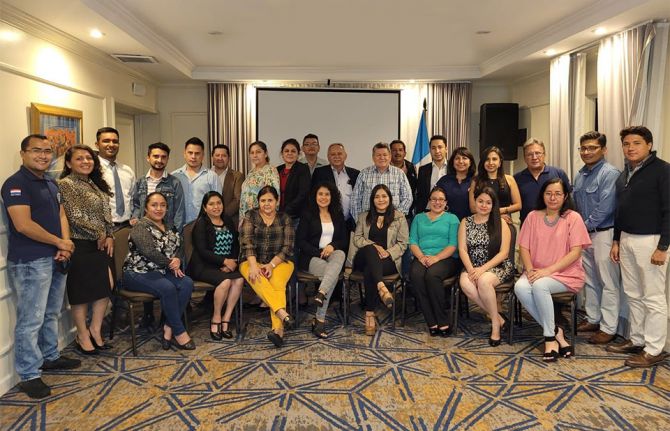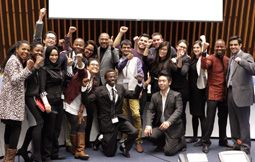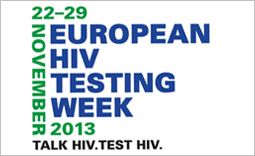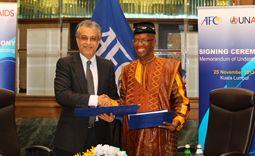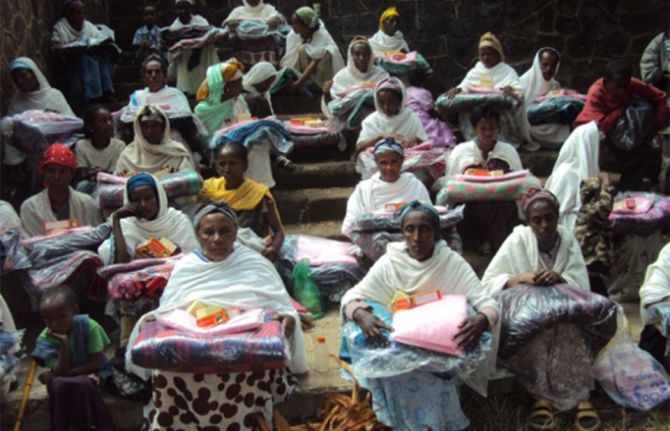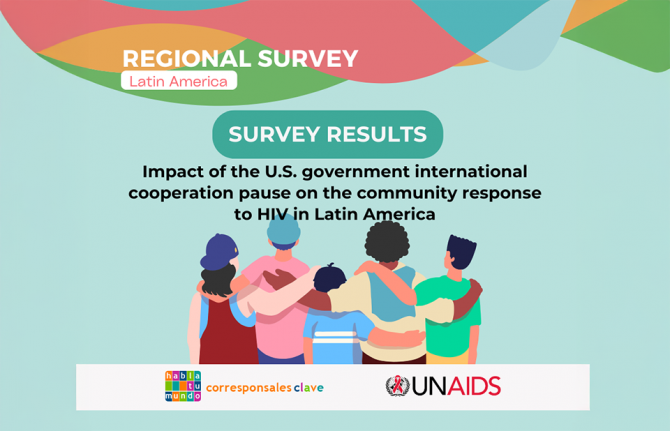
Feature Story
International Labour Conference tackles HIV in the world of work
03 June 2009
03 June 2009 03 June 2009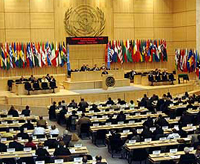
Credit: ILO
Some four thousand representatives of governments, workers’ and employers’ organizations from 183 states around the world are meeting in Geneva for the annual conference of the International Labour Organization. Challenging the AIDS epidemic is high on the agenda and the development of a new international labour standard on HIV and the world of work is one of the key issues for discussion during the Geneva conference which runs from 3-19 of June.
The new labour standard, ground-breaking in its scope and reach, is designed to address the global threat of HIV in the world of work and is an international human rights instrument aimed at extending and strengthening the role of the workplace in the AIDS response.
The existence of an instrument focusing solely on HIV and the world of work will give new impetus to anti-discrimination policies at national and workplace levels.
It will strengthen the contribution of the world of work to countries’ achievement of universal access to HIV prevention, treatment, care and support and encourage information-gathering and reporting.
Dr Sophia Kisting, ILO/AIDS Director, in an interview with ILO Online
The virus affects the most economically active age range in every population and the majority of the 33 million people living with HIV worldwide are workers. Many are still subject to stigma and discrimination and the threat, or reality, of losing their jobs due to their status. Although some progress has been made, prevention and care strategies also need bolstering. The international labour standard aims to help change this situation and would be the first global human rights instrument to focus specifically on HIV and the world of work.
According to Dr Sophia Kisting, ILO/AIDS Director, in an interview with ILO Online, “The existence of an instrument focusing solely on HIV and the world of work will give new impetus to anti-discrimination policies at national and workplace levels. It will strengthen the contribution of the world of work to countries’ achievement of universal access to HIV prevention, treatment, care and support and encourage information-gathering and reporting.”
The journey towards the international standard began when a first report, entitled HIV/AIDS and the world of work, Report IV (1), was sent to all ILO members in January last year. It contained a detailed and wide-ranging questionnaire concerning all aspects of the challenge to AIDS in the workplace. A second document, Report IV (2) , synthesized and summarized the nearly 250 responses received from governments, workers, employers and other partners, most of whom agreed with the need to focus greater attention on HIV through a new international instrument. It is the draft conclusions from this report that will be discussed in depth at the 2009 conference. A second discussion will take place next year and it is expected that the formal adoption of the labour standard will occur at this point. At present the proposal is for an autonomous Recommendation, but the final decision on its form and content rests with the Conference.
ILO Recommendations are not legally binding but serve as guidance for policy and law. If adopted, the new standard would be submitted to national authorities “for the enactment of legislation or other action” and would reinforce the impact of the existing ILO Code of Practice on HIV and the world of work which was adopted in 2001.
The global threat of HIV for workers is inextricably linked with the overarching theme of the International Labour Conference; the growing impact of the world financial crisis on employment and social protection. The ILO has organized a ‘Summit on the Global Jobs Crisis’ scheduled for 15-17 June, involving a number of Heads of State to examine this issue. The forecasts of rising unemployment and poverty have potentially grave implications for the successful response to the AIDS epidemic, given the connection between poverty and HIV.
The ILO highlights the fact that the crisis may lead to cutting of AIDS programmes. Increased poverty may also bring greater risk of HIV as some are forced into unsafe behaviour to support themselves. A recent World Bank report also stressed that funding for AIDS drugs is under threat as the crisis hits the health sectors in a number of countries in Africa, the Caribbean, Europe and Asia. The International Labour Conference is committed to trying to ensure that the many gains that have been made in the challenge to the epidemic in the workplace are not lost or reversed due to current, stark economic realities.
International Labour Conference tackles HIV in th
Cosponsors:
Feature stories:
Funding for AIDS drugs in jeopardy as global financial crisis hits health sector (28 April 2009)
ILO: Action against stigma brings hope to Ethiopia’s agricultural cooperatives (14 April 2009)
ILO and workplace leaders pledge action at ICASA 2008 (04 December 2008)
International labour standard would strengthen the HIV response in the workplace (21 July 2008)
ILO sees significant improvement in workplace attitudes to HIV (25 April 2008)
Health workforce crisis limits AIDS response (29 February 2008)
Multimedia:
Live webcast of selected whole panel discussions and plenary sessions
External links:
98th Session of the International Labour Conference, 3-19 June 2009: Daily update
Publications:
Report IV(2) HIV/AIDS and the world of work ( en | ar | ch | es | fr | ru )
Policy Brief - HIV and International Labour Migration (pdf, 203 Kb.)
AIDS is everybody's business: UNAIDS & business - working together (pdf, 863 Kb.)
Employers' handbook on HIV/AIDS : a guide for action (pdf, 599 Kb.)

Feature Story
'Never abandon, never give up’: ILO film helps China’s migrant workers challenge AIDS stigma
30 April 2009
30 April 2009 30 April 2009
Wang Baoqiang, star actor and former migrant construction worker is now a spokesperson for the ILO HIV/AIDS project in China Credit: courtesy of ILO
Zhang Xiao Hu is one of China’s estimated 200 million migrant workers. He is also one of the stars of ‘Never abandon, never give up’, a short Charlie Chaplin-style film aimed at reducing HIV stigma and promoting condom use among the country’s migrant workers. Beginning on 4 May, the International Labour Organization (ILO) and Mega-info Media, the company which runs China’s national railway station television network, will begin screening the film in 500 stations in 450 cities across the country. Over a three month period, 40 million people will have an opportunity to see the film.
In the film Zhang plays a construction worker stigmatized because he is living with HIV. This mirrors his real life situation as he is China’s first internal migrant worker to speak out publicly about his HIV status and has suffered stigma in the past from colleagues. As he says, “No one wanted to work with me, eat with me or share a dormitory.”
Leading filmmaker Gu Changwei
‘Never abandon, never give up’ is produced and directed for the ILO by Gu Changwei, a winner at the 2005 Berlin Film Festival and considered one of the leading filmmakers working in China today. Established star Wang Baoqiang, who is now serving as a spokesperson for the ILO HIV/AIDS project in China, also takes a lead role in the movie. He befriends Zhang Xiao Hu at his workplace and uses his celebrity persona to encourage his colleagues to cast aside their prejudices.
‘Hometown Fellows’ campaign
The project forms part of the ‘Hometown Fellows’ campaign where the ILO, in partnership with the Ministry of Labour, employer and worker bodies, and the State Council AIDS Working Committee Organization is collaborating with 19 large-scale enterprises in construction, mining and transport sectors in China’s provinces most affected by HIV. Although overall prevalence of the virus is relatively low in China (UNAIDS reported a 0.1% prevalence in 2008), there are pockets of high infection among specific populations and in some localities. With support from grass roots non-governmental organizations, the ILO is carrying out a comprehensive, multi-channel behaviour change programme for 190,350 internal migrant workers in Guangdong, Yunnan and Anhui provinces.
According to Constance Thomas, Director of the ILO in China, partnering with authorities on such projects, “helps us reach out to the workers for social protection to ensure their occupational safety and health…They do have the right to work in China and they have the right not to be discriminated against.”
The ‘Hometown Fellows’ project is intended to address high HIV-related stigma and low condom use among migrants and taps into powerful social networks among migrant workers who often move from rural areas and work together in large cities throughout China.
Formative research among the migrants shows a strong social bond based on common provincial origin that is potentially influential on attitudes and behaviour. This is in sharp contrast to migrant worker perceptions of health officials, company management and receiving communities, where there is, typically, considerable distrust and a sense of alienation.
The ILO behaviour change communication strategy has two tiers. Firstly, it has developed a range of communication tools based on the hometown fellowship concept where key message are delivered through migrant voices. Never abandon, never give up forms part of this intervention.
This movie is an excellent production which can help to reduce stigma and discrimination against people living with HIV far beyond the labour sector. It addresses not only stigma related to HIV, but also vulnerabilities linked with living at the margins of society.
Dr Bernhard Schwartlander, UNAIDS Country Coordinator in China
Secondly, working through enterprise structures, the programme taps into existing migrant social networks to deliver peer education in the workplace, dormitories and nearby entertainment areas. This peer education is reinforced through group training in enterprises as well as targeted messages delivered through company owned television and radio channels.
Dr Bernhard Schwartlander, UNAIDS Country Coordinator in China applauds this production, "This movie is an excellent production which can help to reduce stigma and discrimination against people living with HIV far beyond the labour sector." He added, "It addresses not only stigma related to HIV, but also vulnerabilities linked with living at the margins of society."
Migrant workers make up some 15% of the total Chinese population according to official estimates and they are considered vulnerable to HIV due to challenging social conditions, low HIV knowledge and lack of access to quality health services.
Right Hand Content
Cosponsors:
Feature stories:
‘Love and Relationships’: Film festival in Cambodia addresses HIV prevention (06 April 2009)
New report shows Asian migrant women in the Arab states have heightened vulnerability to HIV (10 March 2009)
Love in a Time of HIV (19 December 2008)
Powerful film brings AIDS issues to communities in Democratic Republic of Congo (16 June 2008)
Publications:
Migrants and HIV: Far away from home club (pdf, 899 Kb.)
Reducing HIV stigma and discrimination: a critical part of national AIDS programmes (pdf, 598 Kb.)
Art for AIDS (pdf, 2.11 Mb.)

Feature Story
Joint action for results: UNAIDS outcome framework, 2009 – 2011
22 April 2009
22 April 2009 22 April 2009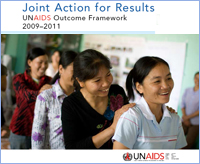
The HIV organizational landscape has evolved and grown more complex over the past decade. UNAIDS, donors and civil society, including networks of people living with HIV, have rightly demanded greater clarity on the relationships between needs, financing, activities and outcomes. Also demanded is greater specificity about the role of UNAIDS and the Secretariat within the wider constellation of actors.
This Outcome Framework, which builds upon the UNAIDS Strategic Framework (2007–2011), will guide future investment and hold the Secretariat and the Cosponsors accountable for making the resources of the UN work for results in countries. It affirms the UNAIDS Secretariat and Cosponsors to leverage our respective organizational mandates and resources to work collectively to deliver results.
Joint action for results: UNAIDS outcome framework, 2009 – 2011 (pdf, 388 Kb)
Joint action for results: UNAIDS outcome framewor
Cosponsors:
Office of the United Nations High Commissioner for Refugees (UNHCR)
United Nations Children's Fund (UNICEF)
World Food Programme (WFP)
United Nations Development Programme (UNDP)
United Nations Population Fund (UNFPA)
United Nations Office on Drugs and Crime (UNODC)
International Labour Organization (ILO)
United Nations Educational, Scientific and Cultural Organization (UNESCO)
World Health Organization (WHO)
World Bank
Publications:
Joint action for results: UNAIDS outcome framework, 2009 – 2011 (pdf, 388 Kb)
Related

Feature Story
UNAIDS Executive Director visits Ethiopia
20 April 2009
20 April 2009 20 April 2009
Mr Michel Sidibé (left) met with HE Girma Woldegiorgis, President of the Federal Democratic Republic of Ethiopia.
Credit: UNAIDS/Y.Gebremedhin
The Executive Director of UNAIDS, Michel Sidibé is in Ethiopia to discuss ways of strengthening UN support to the AIDS response in the country.
High on the agenda will be the progress and challenges Ethiopia is facing in scaling up to universal access to HIV, prevention, treatment, care and support. These issues will be discussed in meetings with a range of stakeholders including the Ethiopian authorities, religious leaders, networks of people living with HIV, and senior officials from the African Union Commission.
Whilst in the country Mr Sidibé will also visit projects in Mekelle, a region some 800 km from the capital Addis Ababa. As well as visiting health facilities and care and support projects in the region, he will also meet with local communities to see first hand how universal access is working for people on the ground.
On the final day of the visit Mr Sidibé will meet with the press to present his vision for the future and highlight the urgent need to invigorate momentum and commitment towards achieving universal access and the need for increased investments for countries to reach their goals.
Right Hand Content
Feature stories:
ILO: Action against stigma brings hope to Ethiopia’s agricultural cooperatives (14 April 2009)
Translating intent into action in Ethiopia (25 November 2008)
Multimedia:
Related

Feature Story
ILO: Action against stigma brings hope to Ethiopia’s agricultural cooperatives
14 April 2009
14 April 2009 14 April 2009
Ajama Kalacha gets ready to plough his field. His community’s support has made it easier for him to cope with HIV Credit: ILO
Ajama Kalacha works hard on his small agricultural plot in Ethiopia’s highlands to provide an income for the extended family he supports. Even though life is tough, Ajama is an optimist - his community treats him well and he believes his prospects for making a living from the land are good. But he was not always so confident.
Seven years ago, Ajama discovered that he had become infected with HIV. At the time stigma and discrimination were widespread in his community and the diagnosis led him to despair. Today Ajama is taking antiretroviral treatment and his health is stable. He has told everyone about his HIV status, and his children and extended family have not been excluded from school or community life as he had once feared.
“My message to others is that living positively with HIV helps you to work harder and leads to a new lifestyle,” he says. “The care and support that I have received has made it much easier for me to cope with my illness.”
This dramatic change in Ajama’s attitude and circumstances came about in 2004 when his agricultural cooperative society in West Oromia State became part of a wider programme to reduce the negative effects of HIV. Funded by the Italian government in cooperation with the International Labour Organization (ILO), the programme works through the Oromia region agricultural cooperative unions that have members in over 200 agricultural primary societies and 14 transport associations.
To ensure that interventions were at the right level, staff carried out an initial study of HIV knowledge and attitudes, which revealed many misunderstandings. For instance, 51 per cent of those interviewed thought HIV could be transmitted by mosquito bites, 17 per cent by sharing a toilet and 6 per cent by working with an HIV-positive person.
The programme has strong support from government and the national cooperative leadership. It works through a range of training approaches, firstly raising awareness of HIV among leaders and then, through specific workshops, training a network of master trainers and peer educators. They in turn roll out the programme at community level, helping to challenge discrimination, change behaviour which may risk exposure to HIV, and set up care and support services for members and their families.
Easily identified by their bags and T-shirts that both bear the slogan, ‘HIV does not discriminate, but people do,’ the peer educators work with the whole community visiting homes, speaking at local gatherings and involving key individuals such as religious leaders. They use an HIV manual and distribute popular information materials that have been translated into the local languages of Afaan Oromo and Amharic. They also help to provide care and support services including treatment.
In Ajama’s cooperative, misunderstandings about HIV, together with the stigma and discrimination directed against those affected, have gradually reduced as a result of this steady work. The positive environment and encouragement he has received gave Ajama the courage to speak out about his status and to have hope for the future.
“I set my mind to starting a new life,” he says. “The care and support for people living with HIV and AIDS has helped greatly to reduce its impact on our lives.”
Right Hand Content
Cosponsors:
Feature stories:
Faces against HIV stigma and discrimination (01 October 2008)
International labour standard would strengthen the HIV response in the workplace (21 July 2008)
ILO sees significant improvement in workplace attitudes to HIV (25 April 2008)
Making a difference: UNAIDS in Ethiopia (08 February 2008)
Publications:
Saving lives, protecting jobs. SHARE Report ( pdf, 3.7 Mb.) ( fr )
ILO Code of Practice on HIV in the workplace
Reducing HIV stigma and discrimination: a critical part of national AIDS programmes (pdf, 598 kb.)
AIDS is everybody's business: partnerships with the private sector (pdf, 1 Mb.)
Greater involvement of people living with HIV (GIPA) (pdf, 245 kb.)
Facts sheets on ILO work and partnerships in Africa:
Ethiopia
Benin ( Fr )
Botswana
Burkina Faso ( Fr )
Ghana
Lesotho
Malawi
Mozambique
South Africa
Swaziland
Togo ( Fr )
Zambia
Zimbabwe
Related

Feature Story
UNAIDS Committee of Cosponsoring Organizations meet
06 April 2009
06 April 2009 06 April 2009
(from left): Joy Phumaphi, Vice President and Head of the Human Development Network, World Bank; Arnauld Akodjenou, Director, Division of Operational Services, UNHCR; Josette Sheeran, Executive Director, WFP; Anarfi Asamoa-Baah, Deputy Director General, WHO; Assane Diop, Executive Director, Social Protection Sector, ILO; Koichiro Matsuura, Director General, UNESCO; Ad Melkert, Administrator ad-interim, UNDP; Ann M. Veneman, Executive Director, UNICEF; Michel Sidibé, Executive Director, UNAIDS; Thoraya Ahmed Obaid, Executive Director, UNFPA; Antonio Maria Costa, Executive Director, UNODC. Paris, 3 April 2009,
The Joint United Nations Programme on HIV/AIDS (UNAIDS) brings together the efforts and resources of ten UN system organizations in the AIDS response. The UNAIDS Committee of Cosponsoring Organizations (CCO) serves as the forum for these Cosponsors to meet on a regular basis to consider matters of major importance to UNAIDS, and to provide input from the Cosponsoring organizations into the policies and strategies of UNAIDS.
On 3 April 2009, the CCO held their first meeting since the appointment of UNAIDS Executive Director Michel Sidibé.
The CCO expressed their full support for “universal access” which Mr Sidibé has outlined as the top priority for UNAIDS as well as the other priority areas of focus which will be set out in the new UNAIDS outcome framework currently being finalized with Cosponsors.
The meeting provided an excellent opportunity to share ideas on supporting countries in achieving their universal access goals. The need for UNAIDS to advocate for an evidence informed AIDS response that is grounded in human rights was accepted by all. Equally important was the need for accountability and results.
The CCO also endorsed the general directions of the 2010-2011 Unified Budget and Workplan including the key priorities and the allocation of resources between the Cosponsors, the Secretariat and Interagency activities. The Secretariat will now work with the Global Coordinators of the Cosponsors to finalize the UBW for the June 2009 meeting of the Programme Coordinating Board.
UNAIDS Committee of Cosponsoring Organizations (CCO)
The CCO comprises representatives from the ten UNAIDS Cosponsors and the UNAIDS Secretariat. It meets twice a year and each Cosponsor rotates as chair of the committee annually, on 1 July.
Right Hand Side
Cosponsors:
Office of the United Nations High Commissioner for Refugees (UNHCR)
United Nations Children's Fund (UNICEF)
World Food Programme (WFP)
United Nations Development Programme (UNDP)
United Nations Population Fund (UNFPA)
United Nations Office on Drugs and Crime (UNODC)
International Labour Organization (ILO)
United Nations Educational, Scientific and Cultural Organization (UNESCO)
World Health Organization (WHO)
World Bank
Related
 Keeping up the momentum in the global AIDS response
Keeping up the momentum in the global AIDS response

24 April 2019
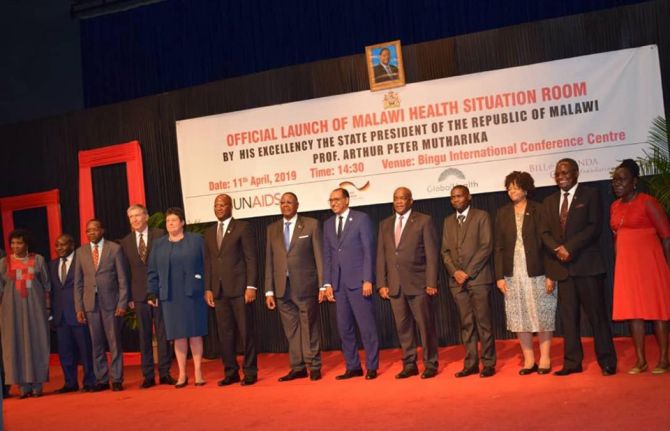 Malawi launches its health situation room
Malawi launches its health situation room

12 April 2019
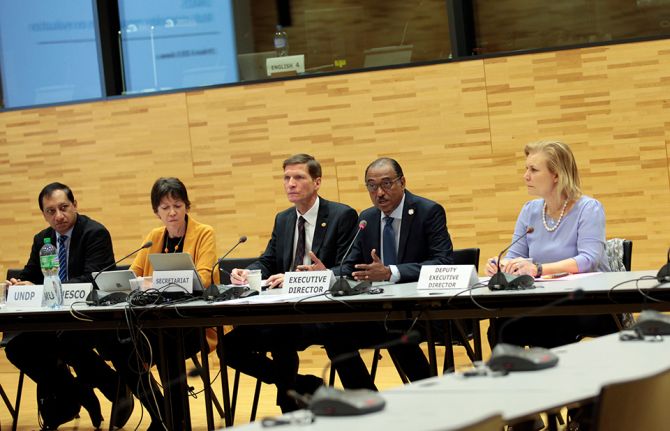 Learning lessons on evaluation
Learning lessons on evaluation

02 April 2019

Feature Story
ILO and workplace leaders pledge action at ICASA 2008
04 December 2008
04 December 2008 04 December 2008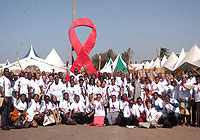
Workplace leaders pledge action at ICASA 2008
Credit: ILO
On the occasion of the 15th International Conference on AIDS and Sexually Transmitted Infections in Africa (ICASA), about fifty workplace leaders gathered together on 4 December at the invitation of the International Labour Organization (ILO).
Earlier in the week, the delegates had visited the Workplace Leaders Pledge Centre and committed themselves to implementing specific initiatives to address HIV in their own workplaces once they return home from the conference.
The ILO recorded the workplace pledges of the participants and invited them to join Mr. Mamadou Sow, the Permanent Secretary of the Ministry of Labour of Senegal, Mr. Assane Diop, the ILO Executive director for Social Protection, Mr. Patrick Obath and Mr. Lamine Fall representing respectively the employers and workers organizations as well as Dr. Sophia Kisting, Director of the ILO Programme on HIV/AIDS and the world of work for the group photo.
“Many ICASA delegates are HIV experts in various fields and probably spoke about HIV/AIDS in a number of forums. However, some might not have thought of taking HIV activities into their own workplace,” explained Dr. Kisting.
Each participant who made a pledge received a gift as a reminder of his or her commitment. The ILO ‘Workplace Leaders Pledge Centre’ will welcome participants until the end of the Conference. It is situated at the ILO stand in the exhibition area next to the UNAIDS stand with other co-sponsors.
Ms. Evelyn Serima, ILO HIV/AIDS Technical Specialist with the ILO Sub-regional Office for Southern Africa, explained that the pledges received demonstrate the commitment of employers and workers to contribute to a more sustained response to HIV/AIDS through workplace leadership.
ILO and workplace leaders pledge action at ICASA

Feature Story
ICASA 2008: Improving national private sector HIV responses
04 December 2008
04 December 2008 04 December 2008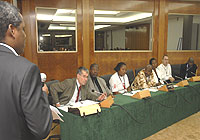
UNAIDS and ILO Joint Satellite Session, 3 December 2008
Credit: UNAIDS
A consensus is emerging at ICASA that in countries across Africa the private sector needs to work more closely together in order to be successful in responding to AIDS.
According to Sophia Kisting, Director of ILO-AIDS speaking at a UNAIDS ILO session yesterday, "The different private sector actors—companies, small and medium enterprises, informal sector—have to work together towards delivering a coherent and comprehensive private sector response to AIDS. We owe that much to those who are affected by the epidemic."
The joint Satellite Session entitled “working towards a comprehensive private sector response at the national level.” It was an opportunity for participants shared what’s working and what needs to be improved in their countries.
Strengthening partnerships across the private sector, reaching out to the surrounding community as well as mobilizing financial and technical resources for HIV were the issues addressed by the delegates.
For this discussion members of the Ghana Business Coalition on AIDS, Federation of Kenyan Employers, Malawi Congress of Trade Unions, Rio Tinto, Standard Bank Africa joined representatives from the International Organization of Employers, ILO, Fondation Sogebank, World Bank, UNAIDS Technical Support Facilities, Partners Against AIDS, GTZ, and the Global Business Coalition on HIV/AIDS, TB and Malaria.
Strengthening partnerships, reaching out to the community
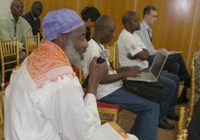
Aldiouma Cissokho addresses the event
Credit: UNAIDS
In Zimbabwe where the Employers’ Confederation, the National Business Coalition and others have created a national forum on the private sector to ensure one voice of the private sector at the Global Fund Coordinating Country Mechanisms.
Another challenge expressed was that have strong leadership. Mr Patrick Obath, Chairman of the Federation of Kenyan Employers, shared their efforts to encourage CEOs to get tested for HIV as a way of generating more support for voluntary testing and counselling within their own companies.
Rio Tinto’s Health Director Mr. Bruno Buclez presented the partnership agreement they have signed with the Government of Cameroon whereby the government is supplying free drugs and the company is making its health facilities available to its employees and to the community. One of the concerns raised about such Public Private Partnerships is their sustainability. This is something Rio Tinto is assessing at the moment. For example, the company is trying to ensure that employees living with HIV who retire from the company continue to receive HIV treatment.
Mr. Tony VanderNest, Senior Health and Wellness, Standard Bank Africa, South Africa explained that his company supports national business coalitions and the Pan African Business Coalition (through notably personnel secondment) because these coalitions are the best vehicle to share experiences among companies.
Mobilizing financial and technical resources for HIV and AIDS.
Ms. Thérèse Lethu, Director from the GBC Europe showcased how the coalition is encouraging sectoral initiatives such as in the tourism and mining industries to optimize the impact of the private sector on the national systems is the primary goal of the GBC.
All participants also agreed that the role of small and medium enterprises should be enhanced. As Erick Maville, Technical Director, GBC Europe explained, "While progress has been made to enhance the contributions of the private sector to the response to AIDS, there is still a lot to do to enhance the participation of small and medium enterprises and the informal sector."
ICASA 2008: Improving national private sector HIV
Cosponsors:
External links:
Oficial web site of ICASA 2008
Contact:
Marie Engel Partnerships Adviser Private Sector Partnerships UNAIDS Tel: +41 22 791 554 Email : engelm@unaids.org
Related

Feature Story
The Life Initiative – Hotels addressing AIDS
23 July 2008
23 July 2008 23 July 2008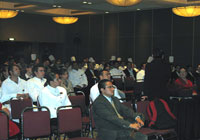 UNAIDS is involving the Mexican hotel industry in a prevention campaign around the International AIDS Conference in August 2008 and in the longer term through the development of sustainable long term HIV workplace policies & programmes Photo: UNAIDS/R.Castillo
UNAIDS is involving the Mexican hotel industry in a prevention campaign around the International AIDS Conference in August 2008 and in the longer term through the development of sustainable long term HIV workplace policies & programmes Photo: UNAIDS/R.CastilloThe International AIDS conference (AIDS 2008) will bring to Mexico approximately 20,000 delegates and 2000 journalists from all over the world from 3-8 August 2008. AIDS 2008 presents a unique opportunity to engage the local hotel industry on issues related to HIV.
UNAIDS and the Mexican hotel industry are launching an HIV prevention campaign entitled “The Life Initiative – Hotels addressing AIDS”. Aimed at hotel guests and staff the initiative will raise awareness about HIV prevention and non-discrimination of people living with HIV. The initiative will also promote the development of sustainable long- term HIV workplace policies and programmes in the hotels. The hotel industry is a key player in the response to AIDS as it can reach a wide and diverse audience with HIV prevention information including its large workforce.
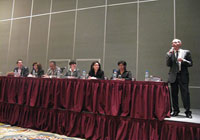 A first inaugural meeting of all the participating hotels took place at the Hotel Marquis in Mexico City on July 4th 2008. Photo: UNAIDS/R.Alion
A first inaugural meeting of all the participating hotels took place at the Hotel Marquis in Mexico City on July 4th 2008. Photo: UNAIDS/R.AlionThe prevention campaign will include the display of AIDS related leaflets, posters and brochures, art exhibitions, distribution of free male and female condoms, and showing of AIDS related films in all participating hotels. Condoms will be distributed at all participating hotels via the “condom project” which has been financed with the support from the United Nations Population Fund (UNFPA).
Sustainable long term HIV workplace policies and programs in hotels
One of UNAIDS’ partners in this initiative, IMPULSO - a network of NGOs experts on the provision of technical assistance on HIV in the workplace – will provide capacity building trainings which include situational analysis, stigma and discrimination program and HIV policy and program development. IMPULSO’s specific workshops in hotels also include training in the use and implementation of a software called Workplace Policy Builder designed to assist companies in developing their own AIDS policies.
 Condoms will be distributed at all participating hotels via the “condom project” which has been financed with the generous support from UNFPA. Photo: UNAIDS/R.Castillo
Condoms will be distributed at all participating hotels via the “condom project” which has been financed with the generous support from UNFPA. Photo: UNAIDS/R.CastilloMore than 5,100 hotel employees have already been trained, covering 7,738 rooms in hotels in Mexico City. They received education information on HIV prevention, an overview of the epidemic in Mexico, and were sensitized on issues related to stigma and discrimination in the workplace.
“In Mexico, we note that nearly 200,000 people are living with HIV and around 5,000 people died in 2006 from diseases related to AIDS. The XVII International AIDS Conference presents a unique opportunity to involve the local hotel industry on issues related to HIV,” said UNAIDS Director of Regional Office for Latin America and the Caribbean, Cesar Nuñez.
All partners will announce the launch of the initiative around a press event on 06 August 2008 at 09:00- the International AIDS Society’s press center. For further information please contact UNAIDS Chief of Private Sector Partnerships, Regina Castillo (castillor@unaids.org)
|
Hotels participating in the “Life Initiative- Hotels addressing AIDS” For this initiative, the official AIDS 2008 international & national hotel chains have been targeted. The 5 national hotel chains are: Grupo Posadas, Hoteles Misión, Grupo Empresarial Ángeles, Grupo Del Ángel and Grupo Hoteles Emporio. The 8 international hotel chains are: Best Western International, InterContinental Hotels Group, Starwood Hotels & Resorts, Sol Melia Hotels & Resorts, Radisson Hotels & Resorts, Ramada International, Group ACCOR and Four Seasons Hotels. So far the following hotels have joined the initiative: NOVOTEL STA FE HOTEL GRAN MELIÁ HOTEL RADISSON FLAMINGOS HOTEL FIESTA AMERICANA REFORMA HOTEL HOLIDAY INN REFORMA HOTEL EMPORIO FIESTA INN CENTRO HISTORICO HOTEL GENEVE HOTEL MARQUIS HOTEL HOLIDAY INN ZONA ROSA HOTEL FIESTA AMERICANA GRAND HOTEL CASABLANCA HOTEL EMBASSY SUITE EUROSTAR SUITE GRAN HOTEL DE LA CIUDAD DE MEXICO HOTEL CENTURY ZONA ROSA NOVOTEL PERINORTE NOVOTEL MONTERREY HOTEL CAMINO REAL HOTEL SHERATON CENTRO HISTORICO MEXICO |
The Life Initiative – Hotels addressing AIDS
Cosponsors:
International Labour Organization (ILO)
Partners:
IMPULSO / Ave de Mexico
CONAES
International AIDS Society (IAS)
Constella Group
Secretary of Tourism in Mexico
CENSIDA
Press centre:
Report finds that Business Coalitions are helping one million companies tackle AIDS in the workplace (24 Jan 2008)
Feature stories:
ILO sees significant improvement in workplace attitudes to HIV (25 April 2008)
Multimedia:
Watch video on the Life Initiative project
Publications:
ILO Code of Practice on HIV in the workplace
Photgallery
(See Powerpoint presentation)

Feature Story
International labour standard would strengthen the HIV response in the workplace
21 July 2008
21 July 2008 21 July 2008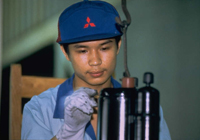
A majority of the 33 million people living
with HIV worldwide are working and in
their most productive years.
Photo: UNAIDS/ILO/C.Serge
A majority of the 33 million people living with HIV worldwide are working and in their most productive years. They generate much-needed income to support their families, and their skills and experience make a big contribution to their workplace and country. However, despite major advances in attitudes and knowledge about HIV, many workers still face discrimination, stigma and fear of losing their job.
Yet the workplace can be one of the most effective settings for responding to AIDS as it is a community where people come together to discuss and learn from one another. Existing structures and facilities such as occupational health services can also be used for HIV prevention, care and support services.
New international labour standard
To expand and strengthen the role of the workplace in the global response to AIDS, the International Labour Organization (ILO), which is a cosponsor of UNAIDS, has launched a process to adopt a new international labour standard in the form of an autonomous Recommendation.
International labour standards are legal instruments drawn up by the ILO's constituents —governments, employers and workers—and which set out basic principles and rights at work.
Strengthening the Code of Practice
If adopted, the new standard would complement, reinforce and extend the impact of the existing ILO Code of Practice on HIV/AIDS and the world of work, which focuses on the protection and promotion of rights and it would also strengthen the workplace contribution to achieving universal access to HIV prevention, treatment, care and support services.

Despite major advances in
attitudes and knowledge
about HIV, many workers still
face discrimination, stigma
and fear of losing their job.
Photo:UNAIDS/ILO/J.Maillard
The current ILO Code of Practice has been integrated into laws and policies in many countries, but because it is a voluntary instrument its uptake is optional. There is also no provision for monitoring the quality or extent of its use, as there would be in the case of a standard.
Although the implementation of a new standard would not be mandatory for member States, it would have to be submitted, once adopted, to national authorities “for the enactment of legislation or other action”. This will provide the ILO and its constituents with an opportunity to review action taken.
The standard presents a good opportunity for enhancing HIV support services in the workplace according to the Director of the ILO’s Programme on HIV/AIDS and the World of Work, Dr Sophia Kisting: “This standard setting process provides us with a special opportunity to work closely with different departments in the ILO, with our constituents, UNAIDS and with networks of people living with HIV. We are encouraged by the positive responses and support we have had, and look forward to the scaling up of concrete responses at the workplace through a strengthened legal-policy environment."
“HIV/AIDS and the World of Work”
The discussion of a new international standard is on the agenda for the 2009 and 2010 International Labour Conferences. In preparation for these discussions, the ILO has prepared an overview report “HIV/AIDS and the World of Work” which includes the most comprehensive compilation to date of national laws and policies on HIV, covering 170 countries.
The report finds that more than 70 ILO member States have, or are in the process of adopting, a general law on HIV, while 30 countries have adopted, or are in the process of adopting, specific workplace rules. Other countries deal with HIV under either equal opportunities or public health legislation, and some have integrated HIV into labour legislation.

the workplace can be one of the most
effective settings for responding to AIDS
as it is a community where people come
together to discuss and learn from one
another. Photo: UNAIDS/J.Spaull
This report and its accompanying questionnaire have been sent to the ILO's member States. Governments are to reply to the questionnaire in consultation with employers and workers which asks for their views on the scope and content of the proposed standard. Labour ministries are also advised to consult with other national ministries and institutions dealing with HIV, and to include organizations of people living with HIV and others engaged in national programmes.
Based on the responses to the questionnaire, a second report will then be produced with draft conclusions for discussion at the 2009 International Labour Conference, which will prepare the path for the adoption of the new international labour standard by 2010.
The “ILO Code of Practice on HIV/AIDS and the world of work” was adopted in 2001 in wide consultation with tripartite constituents in all regions. It has been translated into 57 languages to date. A framework for action related to the workplace, it contains principles for policy development and practical guidelines for programmes at enterprise, community and national levels and it covers in the following main areas:
- Prevention of HIV
- Management and mitigation of the impact of AIDS on the world of work
- Care and support of workers infected and affected by HIV/AIDS
- Elimination of stigma and discrimination on the basis of real or perceived HIV status.
International labour standard would strengthen th
Cosponsors:
Feature stories:
ILO sees significant improvement in workplace attitudes to HIV (25 April 2008)
Publications:
HIV/AIDS and the world of work (pdf, 742 kb)
ILO Code of Practice on HIV/AIDS and the world of work
Implementing the ILO Code of Practice on HIV/AIDS and the world of work: an education and training manual
Saving lives, protecting jobs. ILO/SHARE Report April 2008 (3.7 Mb, pdf) ( fr )


